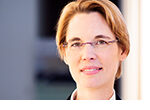 MOLECULAR CELL BIOLOGY
MOLECULAR CELL BIOLOGYThe search for causes of neurodegenerative diseases
In spring 2021, the Faculty of Biology at Johannes Gutenberg University Mainz (JGU) was lucky to acquire a specialist in the field of neurodegenerative disorders – Professor Dorothee Dormann. A cell biologist and biochemist by training, she is an expert in identifying the molecular processes that underlie conditions such as Alzheimer's disease and has already won several awards for her research.
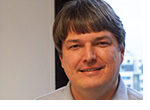 COMPUTER SCIENCE
COMPUTER SCIENCEPowerful technologies may help overcome future challenges
How will the field of artificial intelligence (AI) develop in the coming years? What sort of risks, what chances will open up? Professor Stefan Kramer of the Institute of Computer Science at Johannes Gutenberg University Mainz (JGU) is to find answers to these questions – in an interdisciplinary research project in which he and his colleagues will investigate core aspects of AI over the next six years.
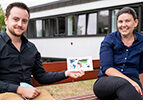 BIOCHEMISTRY
BIOCHEMISTRYGiving more attention to neglected tropical diseases
More than one billion people worldwide suffer from devastating tropical illnesses that to date have been insufficiently researched. Biochemist Professor Ute Hellmich is exploring new ways in which these neglected diseases can be treated. Her research group employs a structural biological approach, concentrating on three closely-related parasites that causes Chagas disease, African sleeping sickness, and leishmaniasis.
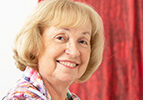 GUTENBERG ALUMNI
GUTENBERG ALUMNIThe never-ending story of equal rights
She was the first State Commissioner for Women in Rhineland-Palatinate and the first politician of the German Christian Democratic Union (CDU) to be appointed Federal Government Commissioner for Migration, Refugees, and Integration. She made important contributions as a Minister of State in the cabinet of German Chancellor Angela Merkel and in the Federal Foreign Office, acted as National Chairwoman of the Frauenunion, the CDU's women's organization, and today is President of the German Commission for UNESCO. From her years at Johannes Gutenberg University Mainz (JGU), where she started studying in 1968, she has taken with her important impulses for her later public offices and tasks.
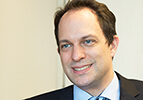 TURKIC STUDIES
TURKIC STUDIESTurkic Studies – a minor subject with major themes
The division of Turkic Studies at Johannes Gutenberg University Mainz (JGU) is in a period of transition. A second professor is currently being recruited, and new, independent degree courses will soon be launched. Professor Julian Rentzsch, who was appointed to Mainz University in 2017, is structuring and supervising this process.
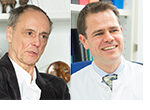 LITMUS
LITMUSSearching for effective ways to diagnose non-alcoholic fatty liver disease
Around 20 million people in Germany suffer from non-alcoholic fatty liver disease (NAFLD). It can cause severe inflammation, cirrhosis of the liver, and even cancer. At present, there is no simple technique to detect NAFLD reliably at an early stage. But this is essential for the development of appropriate new drugs and therapies. The LITMUS research project seeks to make a major contribution in this field: Involving an international consortium, with the Mainz University Medical Center being a key player, the LITMUS network is developing biomarkers that open up new horizons.
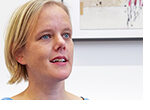 NEUROBIOLOGY
NEUROBIOLOGYHow flies and humans see the world
Professor Marion Silies joined the Faculty of Biology at Johannes Gutenberg University Mainz (JGU) in early 2019. Here she has been investigating the organization and function of circuits in the visual system of the fruit fly. Her work has already earned her numerous awards.
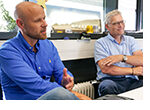 IMMUNOLOGY
IMMUNOLOGYTumors and chronic diseases outsmart the immune system
For decades, researchers at the University Medical Center of Johannes Gutenberg University Mainz (JGU) have been doing outstanding work in the field of immunology. In 2017, their work was further enhanced through the establishment of the Collaborative Research Center (SFB) 1292 on "Targeted influencing of the convergent mechanisms of ineffective immunity in cancer and chronic infections". The German Research Foundation (DFG) agreed to fund it to the tune of EUR 9.7 million for an initial period of four years.
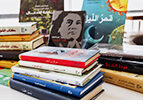 TRANSLATION
TRANSLATIONGerman literature is popular in the Arab World
The year 2019 marks a decade of collaboration between Johannes Gutenberg University Mainz (JGU) and the Kalima section of the Department of Culture and Tourism of Abu Dhabi. Together they are working on translating works of German literature into Arabic. A pool of translators was established at the Faculty of Translation Studies, Linguistics, and Cultural Studies (FSTK) in Germersheim, and 142 titles have been successfully produced since then.
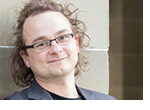 JGU INTERNATIONAL
JGU INTERNATIONALGerman-Polish success stories
Johannes Gutenberg University Mainz (JGU) has a long tradition of contact and exchange with Poland. For decades now there have been close connections with a number of Polish universities. Groundbreaking collaborations and the unique JGU Poland Fellowship are examples of the special relationship with this European neighbor. Adam Seredynski came to Mainz in 2006 as part of a double degree program between SGH Warsaw and JGU – and he ended up staying a bit longer than expected.
